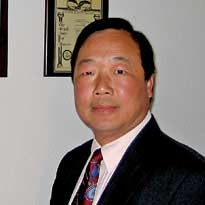As a leading expert in the field of biotechnology research, particularly in applied molecular biology for medical purposes, Dr. Nguyen Trong Binh has become a focal point for major pharmaceutical corporations in the United States. Yet, he continues to travel back and forth to Vietnam, solely to transfer technology to young Vietnamese intellectuals.
Every year, during his time off, he makes a journey from the North to the South of Vietnam. Sometimes, while traveling, he discovers a disease harming rice crops and enthusiastically guides local farmers on prevention and treatment methods. Other times, he engages in discussions to teach farmers how to cultivate straw mushrooms using mushroom spores.
The Heart of a Son Far from Home
 |
Dr. Nguyen Trong Binh |
Since the 1990s, Dr. Binh has sought out universities and biological institutes. At the Tropical Biology Institute in Ho Chi Minh City, besides teaching, he directly trains and assists many young staff members of the institute.
Dr. Van Thi Hanh, who was directly guided by him in her doctoral dissertation in the 1990s and completed her PhD in 2000, recalls: “As my dissertation supervisor, besides providing very valuable materials, Dr. Binh also gave me useful advice. Based on that, I was able to orient and develop my research results for practical application.” Dr. Hanh’s dissertation focused on insect cell studies, aiming to develop vaccines to prevent diseases in shrimp. This was also the time when white spot disease was rampant in Vietnam, making Dr. Hanh’s research highly significant and valuable.
Associate Professor Dr. Nguyen Van Uyen, former deputy director of the Tropical Biology Institute, who has worked with Dr. Nguyen Trong Binh for over 15 years, states: “Dr. Nguyen Trong Binh is an expert in the field of animal cell culture aimed at producing biological products for medical use. This is also an area of great interest to the Tropical Biology Institute, so over the past 15 years, we have received a lot of help from Dr. Binh. Notably, Dr. Binh has provided us with information, materials, and issues related to insect cell culture, especially the Sf9 cell line and its application in producing vaccines against viral diseases in shrimp. The culture of the Sf9 cell line at the institute faced many difficulties due to a lack of facilities and experience, leading to contamination and death. Dr. Binh continued to send us materials until the Tropical Biology Institute successfully cultivated and fully mastered this technique. Dr. Nguyen Trong Binh has made significant contributions and can be considered a model in the transfer of new technology. Without a deep understanding of the realities of the country and the heart of a scientist, along with the desire to contribute, this would not have been possible.”
Dr. Nguyen Trong Binh shares: “Is there anyone successful who does not think of their homeland, of their ancestral land? For me, the ‘Vietnamese essence’ is like the salty taste of salt in my blood. Like other Vietnamese, at this age, I carry a heavy heart full of concern for my country.”
The Thirst for Knowledge
At the age of eighteen, Nguyen Trong Binh set off for Japan to study abroad. Enduring hardships and shortages, the young man was even more determined: he had to learn, to study to become successful. He spent all day immersed in books and the laboratory, and his hard work was rewarded when he became one of the outstanding Vietnamese students in Japan. The subject of his research focused on compounds that combat cancer and viruses sourced from the microorganism Hydrogenovora. At international conferences, his research gained attention and admiration from international professors. In 1981, Nguyen Trong Binh successfully defended his PhD dissertation in microbiology and biochemistry at the University of Tokyo. Upon completing his doctoral dissertation, he was invited by Professor Wolfgang Sadeé at the University of California (UCSF) to conduct research on the reaction mechanisms of cancer drugs. This was a period when high-tech industries in the United States and around the world were booming.
Dr. Nguyen Trong Binh and his colleagues made significant contributions to cancer science in medicine by inventing a new treatment for cancer patients. This involved transplanting genetically modified GmCSF cells to enhance the immune response in cancer patients, strengthening their immune systems to effectively destroy cancer cells. This new treatment has been recognized by the U.S. Department of Health and incorporated into clinical practice. Nguyen Trong Binh’s name has become a point of interest and pursuit among major pharmaceutical companies in various countries. Many of his and his colleagues’ studies have been applied, leading to the mass production of various anti-aging drugs and AIDS treatments (Viracept), generating business deals worth billions of USD annually. However, for him, the pursuit of scientific research is the greatest temptation, and his thoughts of a prosperous Vietnam always occupy his mind.
Bao Nghi
* In 1981, successfully defended his PhD dissertation in microbiology and biochemistry at the University of Tokyo. * Since 1990, he has regularly returned to Vietnam to train Vietnamese students and has been instrumental in transferring new technology to the country. * For nearly a decade, Dr. Nguyen Trong Binh has been conducting research at Pfizer in San Diego, aiming to discover chemicals to combat serious diseases such as cancer, Parkinson’s, and obesity. * Dr. Nguyen Trong Binh holds four patents in the U.S. and Europe and has received numerous international awards. |


















































